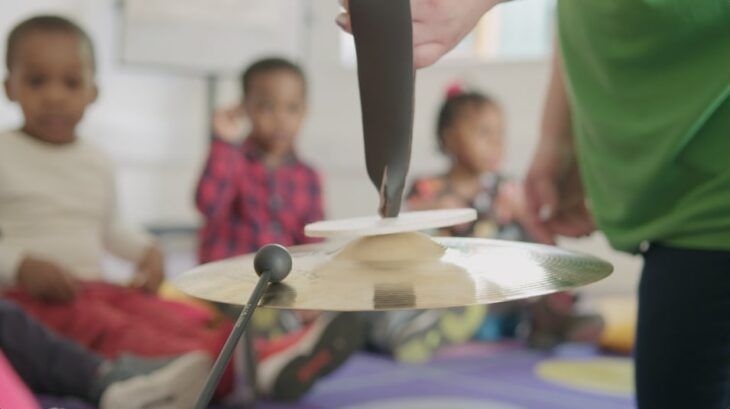Theo’s story
United Kingdom
- Children

Theo was four years old when he was selected by Amy – a student on our Interactive Music-Making programme – to be one of a focus group of four children as part of the practical assignment element of the course.
While the other three children were chosen as likely to benefit most from the music sessions due to challenges they were facing in their behaviour, Theo was primarily selected to act as a confident role model for his peer. He was confident in play, both alone and with others, and had demonstrated a compassionate and inclusive approach with his peers, especially those with additional needs.
Yet as the music sessions began, the revealing power of music came into play. Immediately Amy noticed how once he participated in the session, Theo found it difficult to regulate his energy and focus.
Although he was chosen as a role model for the other children in the group, when playing the instruments in a cymbal and drum activity, Theo played the drum with such force that the drum was damaged. Despite Amy explaining the importance of needing to care for the instruments, Theo continued to mimic hitting the drum hard with his peers before repeating the same behaviour when he got the chance to play them again. He struggled to remain focused and to control his own behaviour, resulting in the instruments needing to be put away to prevent them becoming further damaged.
Amy spoke with his class teacher after the session, and was met by surprise. It was evident the music had revealed something about Theo’s emotional state that had otherwise been hidden. After some further discussion Amy discovered that the structure and routine of Theo’s morning on Fridays before the music session were varied and less predictable than his norm – which was possibly impacting his emotional wellbeing on those days.
Amy, I love music time with you!
Theo
Empowered with this knowledge, Amy used the music sessions to create a safe space for Theo to express his emotions of the morning. Over the subsequent weeks, while Theo continued to find it difficult to maintain his focus and take turns, through shared music experiences and unconditional positive regard, his enjoyment of the music sessions shone through.
As the weeks passed, although Theo sometimes missed the group sessions, through some additional musical activities he began to show improved turn-taking and self-regulation. By the end of the seven-week series of sessions, Theo was able to both lead parts of the session and remain focused while it was the turn of the other children, sitting attentively while waiting.
Impressively, this improvement was not only seen within the sessions, but outside them too. As the youngest of five boys, Theo’s mother spoke of how he sometimes found it difficult to have his voice heard. But that thanks to the music sessions, his behaviour at home had changed. Theo’s class teacher also said he was self-regulating a lot more and controlling his impulses more than before.
I am immensely proud of his progress from the sessions
Amy, Interactive Music-Making student
Theo’s story is a classic example of how music can both reveal previously unexpressed emotions, and over time, help them to be expressed in a more constructive way. And, with his emotions channelled in the safe space of a music session, the positive impact on behaviour could extend far beyond the initial remit of the sessions, supporting Theo’s wellbeing in all aspects of his life.
Related projects
-
Structured Training: Interactive Music-Making (London) 2022
United Kingdom
- Children
- Disability
